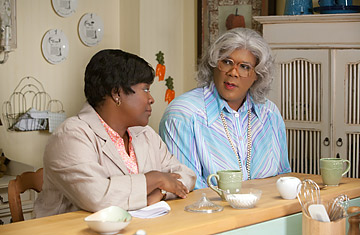
From Left: Shirley (Loretta Devine) and Madea (Tyler Perry) in Tyler Perry's Madea's Big Happy Family.
Mabel Simmons — known as Madea to her extended family, and to millions of Tyler Perry devotees — is a dominatrix of tough love. When a 10-year-old disrespects her, she tells him, "I'm gonna beat your ass till your legs run right up your back." To put the fear of God into a young man with too many problems and no answers, she thunders, "You're gonna wish that sperm did a backstroke when it met the egg that made you." Madea is one ballsy woman, perhaps because she is played by Perry in a chalk wig and a housedress with fat-lady padding. He dresses up in drag so he can dress down the world.
Perry is a multimedia dynamo: best-selling author, progenitor of two TV series and, most prominently, writer, actor, director, producer and financier of immensely popular stage plays and movies designed for an adoring audience of older blacks. The 10 films he's made in the past six years — including Madea's Family Reunion, Why Did I Get Married? and I Can Do Bad All by Myself — have earned more than $500 million at the domestic box office (and less than $2 million abroad; he's strictly an American phenomenon). His latest, clumsily called Tyler Perry's Madea's Big Happy Family, looks to continue his streak as the most powerful star whose movies most American moviegoers have never seen.
With fame comes criticism: some black commentators have knocked Perry's films for stereotyping the black community. Two years ago, Spike Lee said that Perry, whose success had made him the most frequent employer of African-American actors, sells an image that "harkens back to Amos and Andy — the Depression-era radio show, written and performed by whites, about two amiably oafish black men. Last week Perry struck back at his accuser. "I'm so sick of hearing about damn Spike Lee," Box Office Magazine quoted him as saying. "Spike can go straight to hell! ... I am sick of him talking about me, I am sick of him saying, 'This is a coon, this is a buffoon.'"
Movie reviewers tend to ignore or dismiss Perry, and he returns the compliment, refusing to screen most of his films in advance for critics. But his work exerts an odd fascination on me: for it brazenly mixes calculation and naïveté, Christian values and chitlin-circuit earthiness, rowdy jokes and the most convulsive melodrama. I'm also pleased that somebody is making very personal, very popular movies dealing with the contemporary middle- and working-class blacks, and the prickly suspicions between the two groups.
The most impressive thing about Perry, who makes his films at his own studio in Atlanta, is that his films exist totally outside the Hollywood mainstream or, for that matter, the indie backwater. Instead, they seem like signals from some Bizarro planet, where the traditional laws of storytelling and film craft do not apply. Photographed in the flat, harsh tones of a cable-access show, the actors strut and showboat as if the camera were in the upper balcony of Radio City Music Hall, not right up in their faces. It happens that Perry usually creates his stories as musical comedy-dramas for the stage, touring the country for months with his stock company; he then films the plays, but with most of the songs removed. That's a shame, because the emotions he deals with are so outsize, nearly operatic in intensity, that they almost need to be sung; and his performers connect with the audience more eloquently when they sing than when they speak.
Intrigued by this sui-generis auteur, I went last night to Big Happy Family, which played before a predominantly black audience: an African-American couple on a midnight date, and me. (Manhattan's Battery Park area, near Wall Street, is not exactly Madeaville.) The movie proved to be an exasperating, fitfully enjoyable jumble of Perryana, full of insult humor, a gospel choir and, not to give too much away, plot elements borrowed from Chinatown, Precious, Imitation of Life and Cheech and Chong's Up in Smoke — all restitched and Tyler-made.
